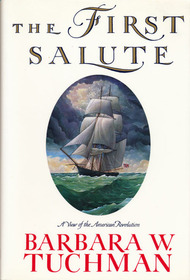Barbara Tuchman has a well deserved reputation as an eminent historian, and I've read several of her books. However, I enjoyed none of them as well as I enjoyed this one. Well-read in history, I mistakingly believed I knew a lot about the American Revolution, but "The First Salute" filled in a lot of holes.
Tuchman uses the occurrence of the first salute to the new American flag by a Dutch colony to write 300 entertaining pages on the history of the Revolution and why we won it. While covering many of the events and people we all learned about in school, or in other books, she also fills in a great many details we didn't.
I particularly enjoyed her brief discussions of the strategy and tactics of 18th century naval warfare and how they evolved, as these were important factors in naval victories which granted us our independence. In addition, she tells us how how many British naval and military officers refused to serve a government they were not in agreement with. The result being British ministers were forced to call-up old, tired and incompetent admirals to run the war. It also didn't help when British admirals and generals severely disliked each other, or subordinates disobeyed orders to ensure their seniors did not achieve victory.
The expression "For want of a shoe a horse was lost," means a small detail changed the course of an event. Tuchman lists many such instances throughout the book. For example, when the British admiral in the Caribbean sent a small schooner to New York to inform the British forces there of intelligence he had on the French fleet and his plans to defeat it, three American privateers captured that ship and the message never arrived at New York. This severely changed and delayed a powerful British response to the presence of the French fleet which was essential to the American-French military at Yorktown.
Aside from the fact that it was also well written, how Tuchman was able to fit so much information into 300 pages mystifies me. This book is now one of my primary references when I discuss with my friends how the Revolution was won.
Tuchman uses the occurrence of the first salute to the new American flag by a Dutch colony to write 300 entertaining pages on the history of the Revolution and why we won it. While covering many of the events and people we all learned about in school, or in other books, she also fills in a great many details we didn't.
I particularly enjoyed her brief discussions of the strategy and tactics of 18th century naval warfare and how they evolved, as these were important factors in naval victories which granted us our independence. In addition, she tells us how how many British naval and military officers refused to serve a government they were not in agreement with. The result being British ministers were forced to call-up old, tired and incompetent admirals to run the war. It also didn't help when British admirals and generals severely disliked each other, or subordinates disobeyed orders to ensure their seniors did not achieve victory.
The expression "For want of a shoe a horse was lost," means a small detail changed the course of an event. Tuchman lists many such instances throughout the book. For example, when the British admiral in the Caribbean sent a small schooner to New York to inform the British forces there of intelligence he had on the French fleet and his plans to defeat it, three American privateers captured that ship and the message never arrived at New York. This severely changed and delayed a powerful British response to the presence of the French fleet which was essential to the American-French military at Yorktown.
Aside from the fact that it was also well written, how Tuchman was able to fit so much information into 300 pages mystifies me. This book is now one of my primary references when I discuss with my friends how the Revolution was won.




